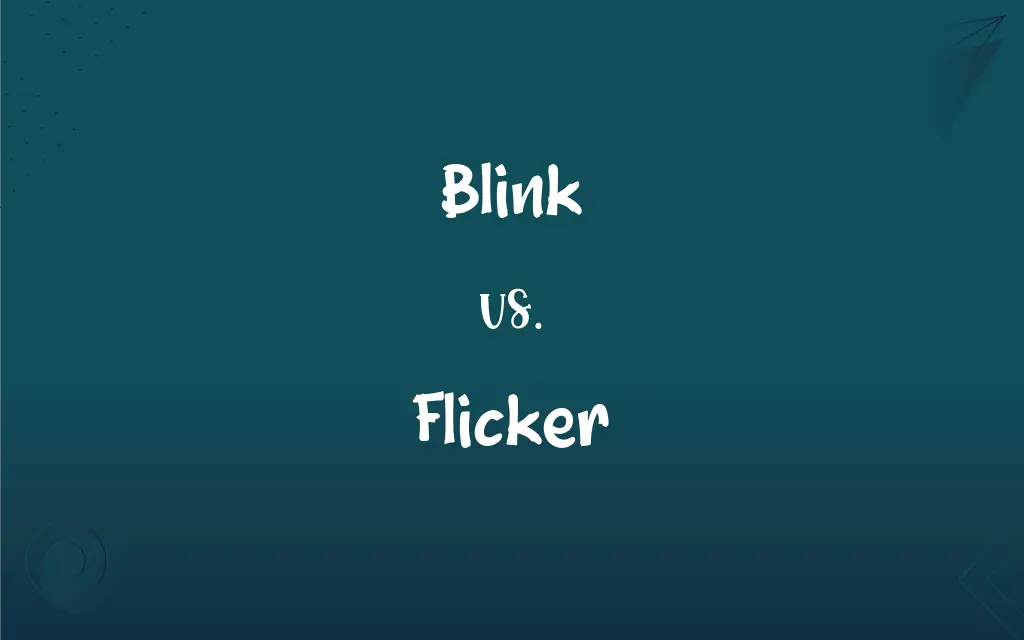Blink vs. Flicker: What's the Difference?
Edited by Janet White || By Harlon Moss || Published on December 17, 2023
Blink refers to quickly opening and closing the eyes, while flicker describes a rapid, intermittent light or movement.

Key Differences
Blinking is a rapid opening and closing of the eyelids, often involuntary, to keep the eyes moist and clear of debris. Flickering, however, refers to a light or image that rapidly appears and disappears or moves in an unsteady manner.
A blink is typically a brief action, often lasting only a fraction of a second, and is associated with the physiological function of the eyes. Flickering can be a longer-lasting phenomenon, often observed in lights or screens, indicating instability or a technical issue.
Blinking can also be used metaphorically to indicate a very short duration ("in the blink of an eye"). Flicker, in a metaphorical sense, can describe something that is fleeting or transient, like a hope or idea ("a flicker of hope").
The action of blinking is generally consistent and predictable, being a regular function of the human body. Flickering, in contrast, is often erratic and unpredictable, commonly associated with electrical faults or natural phenomena like fire.
Blinking is primarily a human action, while flickering can occur in various contexts, such as with lights, flames, or electronic screens, and is not limited to biological functions.
ADVERTISEMENT
Comparison Chart
Definition
Quick opening and closing of the eyes
Rapid, intermittent light or movement
Duration
Brief, typically a fraction of a second
Can be longer, sustained over time
Association
Physiological function of the eyes
Indicates instability or technical issue
Metaphorical Use
Indicates a short duration
Describes something fleeting or transient
Context
Primarily a human action
Occurs in various contexts, not limited to biological functions
ADVERTISEMENT
Blink and Flicker Definitions
Blink
An action to moisten or protect the eyes.
He blinked to clear the dust from his eyes.
Flicker
A rapid, intermittent light movement.
The candle flame flickered in the wind.
Blink
To quickly open and close the eyes.
She blinked rapidly in the bright light.
Flicker
To appear and disappear quickly.
A smile flickered across her face.
Blink
A very short period of time.
The opportunity was missed in the blink of an eye.
Flicker
To move unsteadily or waveringly.
Shadows flickered on the wall.
Blink
To briefly interrupt vision.
He blinked and missed the shooting star.
Flicker
A sign of instability or malfunction.
The old TV's screen started to flicker.
Blink
To show surprise or disbelief.
She blinked in astonishment at the news.
Flicker
A brief, transient occurrence.
There was a flicker of hope in his eyes.
Blink
To close and open one or both of the eyes rapidly.
Flicker
To move waveringly; flutter
Shadows flickering on the wall.
Blink
To look in astonishment or disbelief, typically with the eyes blinking
Stood blinking at the money they found in the drawer.
Blinked at the results of the experiment.
Flicker
To burn or shine unsteadily or fitfully
The candle flickered before sputtering out.
FAQs
Why do we blink?
Blinking moisturizes the eyes, clears away dust particles, and offers a momentary rest to the eye.
What is a blink reflex?
The blink reflex is an automatic response to stimuli threatening the eye, like bright light or foreign objects.
Do all animals blink?
Most vertebrates blink, but the method and frequency vary widely across species.
What is the difference between blinking and winking?
Blinking involves both eyes, while winking is the intentional closing of one eye.
Is flickering harmful to the eyes?
Prolonged exposure to flickering light can cause eye strain and discomfort.
What does blink mean?
Blinking is the rapid opening and closing of the eyelid.
What causes lights to flicker?
Flickering in lights can be caused by voltage changes, loose connections, or faulty bulbs.
How often does a person blink?
On average, a person blinks about 15-20 times per minute.
Can you control your blink rate?
Yes, to some extent, but blinking is primarily an involuntary, reflex action.
Can flickering be intentional in design?
Yes, flickering can be used intentionally in design for effects in movies, games, and art.
How does flicker affect mood?
Flickering lights can create an unsettling atmosphere, often used for dramatic or horror effects.
Can animals perceive flicker?
Yes, but different species may perceive flicker rates differently than humans.
How is flicker measured?
Flicker is measured in terms of frequency (cycles per second) and the intensity of light changes.
Can blinking indicate health issues?
Abnormal blinking rates can indicate eye problems or neurological conditions.
Is it possible not to blink?
It's possible to avoid blinking for a short time, but it's uncomfortable and potentially harmful for the eyes.
What does flicker mean?
Flickering refers to a rapid, unsteady, or intermittent flashing or fluctuation of light.
Does blinking help with focus?
Yes, blinking helps in refocusing the eyes and maintaining visual attention.
What is a flicker rate?
Flicker rate refers to the frequency at which a light source turns on and off.
What is flicker vertigo?
Flicker vertigo is a disorienting condition caused by exposure to certain flickering frequencies.
Is screen flicker problematic?
Screen flicker can cause eye strain, headaches, and visual discomfort.
About Author
Written by
Harlon MossHarlon is a seasoned quality moderator and accomplished content writer for Difference Wiki. An alumnus of the prestigious University of California, he earned his degree in Computer Science. Leveraging his academic background, Harlon brings a meticulous and informed perspective to his work, ensuring content accuracy and excellence.
Edited by
Janet WhiteJanet White has been an esteemed writer and blogger for Difference Wiki. Holding a Master's degree in Science and Medical Journalism from the prestigious Boston University, she has consistently demonstrated her expertise and passion for her field. When she's not immersed in her work, Janet relishes her time exercising, delving into a good book, and cherishing moments with friends and family.







































































